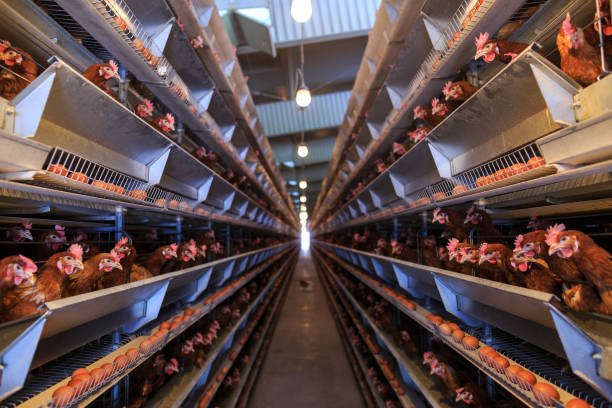How Much Does It Cost to Raise 10,000 Layers in Nigeria?
Time : 2024-09-28
Poultry farming has become an increasingly popular venture in Nigeria, particularly the raising of laying hens. The market for eggs is expanding due to population growth and changing dietary preferences. However, aspiring poultry farmers often grapple with one crucial question: How much does it cost to raise 10,000 layers in Nigeria? To answer this, we will explore the market prospects, the specific costs involved, and the role of equipment suppliers like Livi Machinery.
Laying Hen Farming Market Prospects in Nigeria
The demand for eggs in Nigeria is on the rise, driven by both local consumption and increased urbanization. Eggs are a staple protein source for many households and are integral to various diets across the country. As more people move to urban areas, the need for affordable and nutritious food options has led to an uptick in egg consumption.
The Nigerian government has recognized the importance of the poultry sector and is implementing policies to enhance production capabilities, provide access to veterinary services, and improve feed supply chains. Additionally, rural farmers are increasingly adopting modern farming techniques, which have significantly boosted productivity.
These positive market dynamics present lucrative opportunities for new entrants looking to invest in laying hen farming. However, understanding the cost of raising 10,000 laying hens in Nigeria is essential for assessing the feasibility and profitability of such an investment.
Cost of Raising 10,000 Laying Hens in Nigeria
When considering the cost of raising 10,000 laying hens in Nigeria, several key expenses must be accounted for:
1. Start-up Costs
The initial costs for starting a layer farm can vary widely based on location, housing systems, and equipment used:
- Housing: Constructing a suitable poultry house for 10,000 layers may range from ₦2,000,000 to ₦5,000,000 (approximately $4,500 to $11,250). This cost includes construction materials, labor, and ensuring proper ventilation and lighting.
- Equipment: Essential equipment such as feeders, drinkers, and nesting boxes can cost between ₦1,500,000 and ₦3,000,000 ($3,375 to $6,750). Investing in high-quality equipment is crucial for maximizing productivity and minimizing losses.
- Day-Old Chicks: Purchasing day-old layer chicks is another significant expense. The price per chick can range from ₦300 to ₦500 ($0.67 to $1.12), bringing the total for 10,000 chicks to about ₦3,000,000 to ₦5,000,000 ($6,750 to $11,250).
2. Operational Costs
Operational costs arise once the farm is running and include:
- Feed: Feed constitutes the largest portion of ongoing costs. A laying hen requires approximately 120 grams of feed daily. With an average feed cost of ₦130 to ₦180 per kilogram (around $0.29 to $0.40), total feed costs can reach ₦15,000,000 to ₦20,000,000 ($33,750 to $45,000) annually for 10,000 layers.
- Water Supply: Adequate hydration is critical for laying hens. While water costs can vary, budgeting around ₦200,000 to ₦300,000 ($450 to $675) annually should cover utility bills.
- Healthcare: Vaccination and medication expenses can amount to ₦500,000 to ₦1,000,000 ($1,125 to $2,250) annually. Regular health checks and preventive care are vital for maintaining flock health.
3. Labor Costs
Labor costs depend on the level of automation and the number of employees you hire. For a farm of this scale, you might require two to five workers, which can lead to monthly labor costs of about ₦150,000 to ₦300,000 ($337 to $675).
4. Miscellaneous Costs
Other costs to consider include utilities, maintenance, insurance, and marketing. An estimated budget for these could range from ₦500,000 to ₦1,000,000 ($1,125 to $2,250) annually.
Total Estimated Costs
When adding all these expenses together, the cost of raising 10,000 laying hens in Nigeria can vary significantly but typically falls within the range of ₦24,000,000 to ₦36,000,000 ($54,000 to $81,000) for the first year. This estimate covers start-up costs and operational expenses, providing a comprehensive overview for prospective farmers.

Layer Equipment Suppliers in Nigeria – Livi Machinery
To successfully run a laying hen farm, sourcing quality equipment is paramount. One notable player in the market is Livi Machinery, a reputable supplier that specializes in poultry farming equipment in Nigeria. They offer a wide range of products tailored to meet the needs of layer farms and ensure optimal productivity.
Why Choose Livi Machinery?
- Quality Equipment: Livi Machinery is known for its durable and efficient poultry equipment. Their products, including automatic feeders, drinkers, nesting boxes, and egg collection systems, are designed to enhance the operational efficiency of layer farms and minimize labor costs.
- Innovative Solutions: With advancements in technology, Livi Machinery incorporates modern innovations into their equipment that boost productivity while ensuring animal welfare. For instance, their automated feeding systems can significantly reduce feed wastage and improve feed conversion rates.
- Local Support: As a supplier operating within Nigeria, Livi Machinery provides local support and services, including maintenance and repairs. This is crucial for farmers who may experience downtime due to equipment failure, as timely assistance can help mitigate losses.
- Customized Solutions: Different farms have varying needs based on scale, budget, and management style. Livi Machinery offers customizable solutions that cater specifically to these diverse requirements, enabling farmers to maximize their investment.
- Training and Consultation: Beyond just supplying equipment, Livi Machinery also offers training sessions and consultation services for farmers. This education helps them understand how to take full advantage of their investments and run more efficient operations.
Conclusion
Raising 10,000 layers in Nigeria presents both opportunities and challenges. While the potential for profit exists due to high demand for eggs, understanding the complete cost of raising 10,000 laying hens in Nigeria is essential for any aspiring poultry farmer. By carefully analyzing start-up and operational expenses, prospective farmers can make informed decisions about whether to enter this lucrative market.











